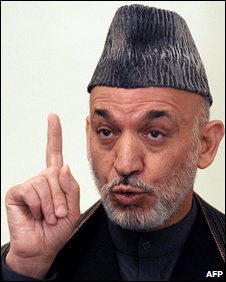 Relations between President Karzai’s Afghan government and Washington are at an all-time low. As Richard Holbrooke – President Obama’s envoy to Afghanistan and Pakistan – prepares to make his first visit to the region since being appointed, the BBC’s Ian Pannell in Kabul looks at why the relationship has soured.
Relations between President Karzai’s Afghan government and Washington are at an all-time low. As Richard Holbrooke – President Obama’s envoy to Afghanistan and Pakistan – prepares to make his first visit to the region since being appointed, the BBC’s Ian Pannell in Kabul looks at why the relationship has soured.
Hamid Karzai has become increasingly vociferous in his criticism of American military tactics and has been making half-hearted threats to shift his allegiance to Moscow if he does not get his way.
Washington has yet to publicly declare its hand but a series of well-placed leaks, briefs and snubs have raised the prospect that it could move its support elsewhere in this year’s presidential election.
One Afghan newspaper spoke of “a new cold war”.
A senior Afghan government official says the new Obama administration has insulted President Karzai and one prominent MP accuses America of “running a shadow-government”.
‘Narco-state’
The decline in relations began with a visit last year by Joe Biden, now the vice-president, to Kabul.
At the time, as the Democratic vice-presidential candidate, he attended a private meeting with Mr Karzai.
A well-placed source describes Mr Biden, exasperated at not getting “straight answers” on drugs and corruption, launching into a verbal tirade and storming out of the meeting.
In a country where honour and decorum are second only to God and country, this was less than tactful.
On the campaign trail and more recently in confirmation hearings, senior members of President Barack Obama’s team have questioned the effectiveness and honesty of Hamid Karzai’s government.
Secretary of State Hillary Clinton’s written statement to Congress during her confirmation hearing called Afghanistan a “narco-state” that was “plagued by limited capacity and widespread corruption”.
She may have been wise enough not to use the phrase in her public testimony but by the time it was reported on the front page of the newspapers in Kabul, it did not really make much difference.
‘Potential impediment’
Earlier in January the Nato secretary-general wrote an opinion piece about the lack of leadership in the country, laying the blame not at the feet of the Taleban but the lack of governance.
Then there was a recent article in the New York Times. Quoting anonymous “senior administration officials”, it said Washington planned to take a tougher-line with Kabul and that Hamid Karzai was now regarded as “a potential impediment to American goals” in the country.
Hamid Karzai is an avid reader of the Western press and is known to be highly sensitive to criticisms they may have of him. Publicly he has not responded but he is now under considerable pressure.
His government’s writ is limited to Kabul, the north and a few urban spots elsewhere in the country.
His own popularity has fallen and some whisper privately and mischievously about his “state of mind”.
When asked whether the country was heading towards a crisis, one senior political figure responded that the country was already in one.
Old Afghan hand
President Karzai has been holding a series of meetings with former Mujahedeen commanders in the past few weeks amid suggestions that he is trying to align the cEurasia Press & News › Add New Postountry with Russia.
That has certainly been his public stance. As well as a deliberately leaked “letter of understanding” with Moscow, President Karzai publicly warned America that unless it supplied the military hardware he wanted, he would look to other countries for support.
No-one was in a moment’s doubt who this meant. The Russian ambassador, Zamir Kabulov, an old Afghan hand, was seen strutting around parliament last week.
He has warned that the US and Nato are repeating the same mistakes of the Soviet occupation of Afghanistan. As he was posted to the Soviet Embassy at the time, his opinion is worth considering.
Now President Karzai has sent a document to Nato outlining new “rules of engagement”. If implemented they would substantially alter the mandate for foreign forces in the country.
It seems inconceivable that there could be a real and lasting schism between Kabul and Washington. It will be the job of Richard Holbrooke, the US Special Envoy for Afghanistan and Pakistan, to ensure that does not happen.
But the date has been set for Afghanistan’s presidential election and the West’s disappointment with Hamid Karzai can no longer be disguised.
A number of challengers are jostling for American support and in the current climate, their chances are starting to improve.
 Eurasia Press & News
Eurasia Press & News


